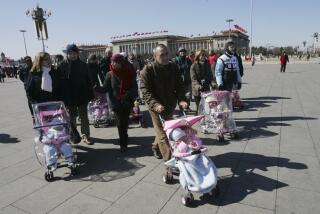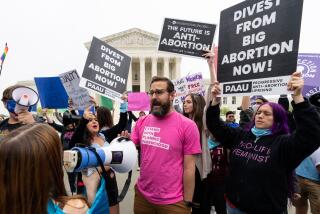Citing Chinese Abortions, U.S. Refuses to Fund U.N. Program
WASHINGTON — The Bush administration said Friday it would withhold $34 million in dues from the United Nations Population Fund, acting against the program for the third consecutive year because the administration believes the fund indirectly supports Chinese government programs that force women to have abortions.
Officials said they were taking the step because of a U.S. law that prohibits aid to agencies that participate in coercive family-planning practices. Disagreeing with U.N. officials and others who said the money was not used for abortions under China’s population-control laws, U.S. officials said almost any aid helped advance China’s policies.
“By funding these programs we would be indirectly helping the Chinese improve management of programs that result in coercive abortions, and that’s prohibited by our law,” Richard Boucher, the chief State Department spokesman, told reporters.
The move brought protests from U.N. officials, who said it would hurt public health programs around the world, and from liberal advocacy groups and lawmakers, who contended it reflected election year politics. Some conservative groups hailed the move. The action also could increase friction with China at the end of a week in which the two governments clashed on the issue of U.S. arms sales to Taiwan.
Thoraya Ahmed Obaid, executive director of the Population Fund, said in a statement that the U.S. contribution “could have saved thousands of lives” in nearly 140 countries where the fund works to prevent an estimated 600,000 deaths that occur during pregnancy and delivery and in botched abortions. She said the fund “has not, does not and will not ever condone or support coercive activities of any kind, anywhere.”
Fund officials said a U.S. fact-finding team sent to China two years ago found no evidence that the fund had supported or taken part in management of Chinese programs of coercive abortion or involuntary sterilization. Investigations by the United Nations, the British Parliament and a group of religious leaders had reached the same conclusion, they said.
But Boucher, the State Department spokesman, said the department had come to the conclusion that the fund was indirectly supporting coercive abortions “after sending delegations, after talking to all the parties involved, after careful study of our law.”
He said U.S. officials had tried to work with fund officials and China to find a way that connections “between the fund’s activities and coercive abortions might be severed.”
But, he added, “essentially the situation’s the same as it was in years past, and therefore, we felt we had to make the step.”
China imposes prohibitive fees on couples who bear children without approval, leading many to abort pregnancies.
The fund estimated that the U.S. money -- more than 10% of its $300-million budget -- could have helped prevent large numbers of abortions, unwanted pregnancies and maternal and infant deaths around the world.
An antiabortion group, Concerned Women for America, praised President Bush “for reaffirming his stand against coercive abortion.”
Wendy Wright, an official of the group, said: “The [fund’s] assistance of coercive family-planning programs obviously contradicts its claims to promote women’s reproductive rights. What could be a greater violation of a woman’s rights than a forced abortion?”
Sen. Patrick J. Leahy (D-Vt.) said the decision reflected “the worst of extremist, election year politics” on the part of the administration.
“They know full well that this decision will result in more abortions, not fewer ... and it will only weaken [the fund’s] efforts to end coercion in China,” Leahy said.
The 35-year-old fund describes itself as the largest multinational organization working to improve family planning and reproductive health. The organization works in 140 countries, at their governments’ invitation.
Rep. Carolyn B. Maloney (D-N.Y.), who has led the congressional effort to resume the U.S. contribution to the fund, said women and children would continue to suffer “because of a small, right-wing constituency” that rejected a proposed compromise to focus funds on specific medical needs.
“The world’s neediest women and children are again paying the price for the president’s reelection campaign to play to his far-right base,” Maloney said.
*
Times staff writer Maggie Farley in New York contributed to this report.
More to Read
Sign up for Essential California
The most important California stories and recommendations in your inbox every morning.
You may occasionally receive promotional content from the Los Angeles Times.











